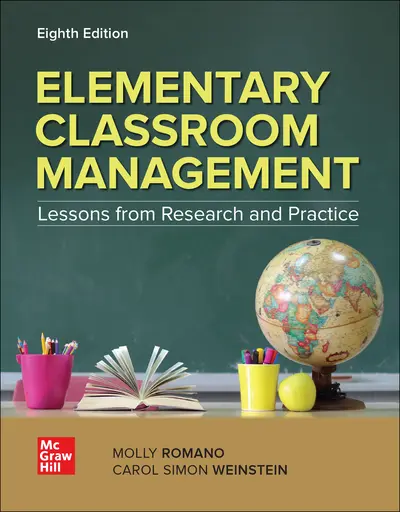My Account Details

ISBN10: 1264299834 | ISBN13: 9781264299836

* The estimated amount of time this product will be on the market is based on a number of factors, including faculty input to instructional design and the prior revision cycle and updates to academic research-which typically results in a revision cycle ranging from every two to four years for this product. Pricing subject to change at any time.
Instructor Information
Quick Actions (Only for Validated Instructor Accounts):
Elementary Classroom Management: Lessons from Research and Practice is a comprehensive guide to classroom management, presenting proven, tried-and-true methods for designing classroom environments where elementary school students can succeed academically, socially, and emotionally. This updated, streamlined eighth edition balances the latest research on classroom management with the wisdom of practice, following five real teachers managing elementary school classrooms. The teachers featured in this text teach different grade levels and in school districts that vary in terms of race, ethnicity, and socioeconomic status, demonstrating how classroom management practices can be applied with diverse students in diverse settings. In this text, teachers and teachers-in-training will learn all they need to know about classroom management through real-life stories and examples, including how to build positive relationships with students, implement engaging and effective instruction, use good preventive management strategies, and include and teach all children.
CHAPTER 1 Managing Classrooms to Nurture Students, Build Self-Discipline, and Promote Learning
PART II ESTABLISHING AN ENVIRONMENT FOR LEARNING
CHAPTER 2 Designing the Physical Environment
CHAPTER 3 Developing Positive Teacher-Student Relationships
CHAPTER 4 Fostering Positive Peer Relationships
CHAPTER 5 Establishing Expectations for Behavior
CHAPTER 6 Knowing Your Students and Their Special Needs
CHAPTER 7 Working with Families
CHAPTER 8 Making the Most of Classroom Time
PART III ORGANIZING AND MANAGING INSTRUCTION
CHAPTER 9 Enhancing Students’ Motivation to Learn
CHAPTER 10 Managing Independent Work, Recitations, and Discussions
CHAPTER 11 Managing Small-Group Work
PART IV PROTECTING AND RESTORING ORDER
CHAPTER 12 Responding Effectively to Inappropriate Behavior
CHAPTER 13 Preventing and Responding to Chronic Misbehavior and Violence
Need support? We're here to help - Get real-world support and resources every step of the way.
